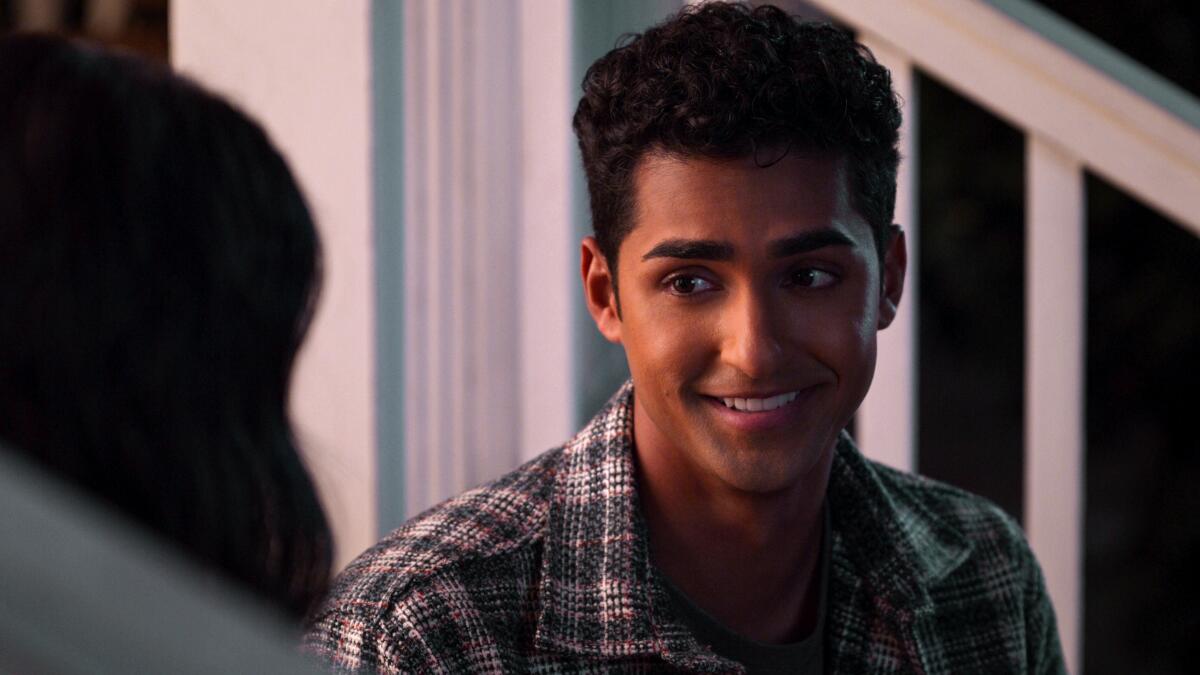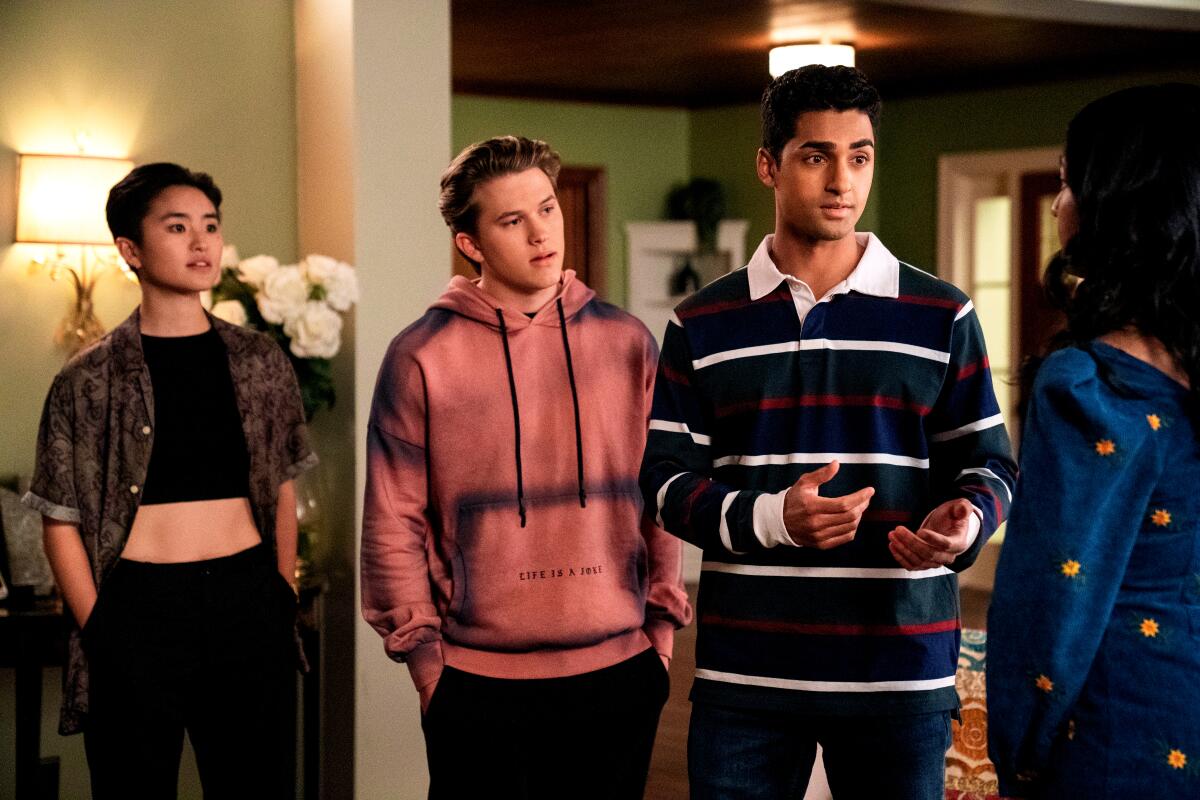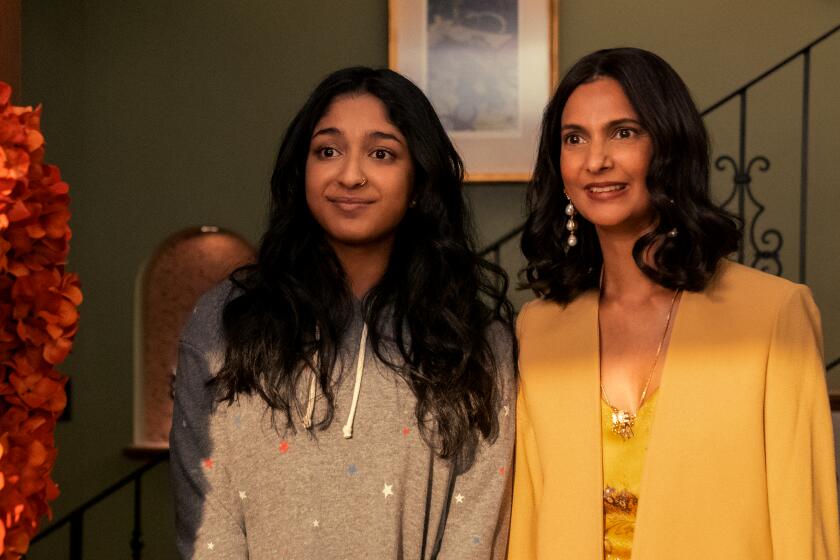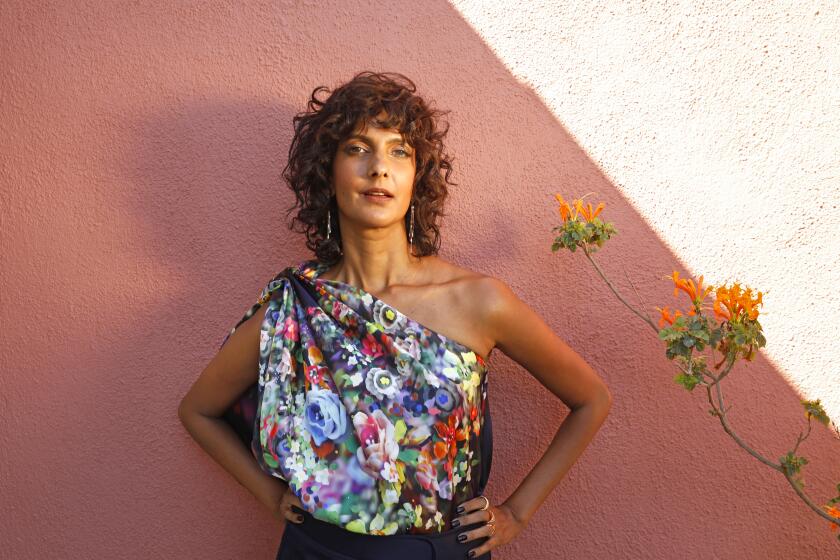‘Never Have I Ever’s’ new heartthrob wants to subvert the ‘model minority’ stereotype

- Share via
This story contains spoilers for “Never Have I Ever” Season 3.
A major debate among fans of “Never Have I Ever,” Netflix’s teen dramedy created by Mindy Kaling and Lang Fisher, is who lead Devi (Maitreyi Ramakrishnan) should date. Should she go for the brains (Jaren Lewison’s Ben, who never left a scrap of extra credit on the table)? Or the brawn (Darren Barnet’s ab-tastic Paxton Hall-Yoshida)?
But the show’s third season, which releases all 10 episodes on Friday, presents a different quandary: Why not find someone who’s a little bit of both?
This season introduces actor Anirudh Pisharody as Des, a teen from a rival high school who is both good-looking and smart — he even gets his own John Hughes-movie-style, slo-mo entrance. Des meets Devi at a party and bowls her over with his charm and intellect while also making her check her own biases.
“As a creator who is making content with South Asian characters, I felt like we hadn’t been able to see an object of desire in a young Indian guy,” Kaling says. “That is something that, growing up, I had a lot of complicated feelings on. We talked about this unconscious bias about Indian men. And I think it was freeing and great to be able to showcase that.”
Netflix’s breakout star Maitreyi Ramakrishnan on her childhood and how she got mega-famous practically overnight, during a pandemic
Fisher says that Pisharody “exuded a relaxed confidence when he was reading the part that just made him feel like ‘Yeah, Devi would be attracted to this guy because he’s so comfortable in his skin.’ When he comes into a room he owns it, but in an effortless way.”
Pisharody, 28, will tell you that was hardly the vibe he was giving off in high school, describing himself as the “nerdy guy.”
Video chatting from a hotel room in New Mexico, where he’s filming his upcoming turn on the third season of ABC’s crime drama “Big Sky,” Pisharody discussed the perception of South Asian men onscreen, reliving the high school experience and pronouncing his name.
You’re not a teenager. Is it weird to go out for teenage roles?
I definitely have that age range where it’s between 18 to 30. But, because I have a youthful appearance, I get to pass off as, like, 17. There’s been some projects where the role will be 14 or 15. And those I’m like, “OK, this is a bit too young.”
You’ve described this role as a “nontraditional” character in another interview. When Des and Devi meet, she is surprised at how confident and charming he is. She was expecting a dork. Was this role different from other roles you’ve seen? How does Des differ from how you were in high school?
It’s very rare for you to be able to play any character that’s completely subversive of that “model minority” stereotype. I’ve had the pleasure of playing other roles, as well, that aren’t traditional Indian characters. But a lot of them have been, you know, whether it’s a short film or a commercial thing, a very Indian guy who worked in an office or a doctor.
From the get-go, Devi initially thinks, “Oh, my God, he’s a loser.” But then he’s talking about how his friend stopped talking to him because he hooked up with a girl he likes. And the fact that he talks about being on the debate team and that he’s popular in high school and they’d be harsh on the jocks. … Obviously, I’m not in high school anymore. But when I was in high school [popularity] was definitely [not] associated with those groups. And, especially being an Indian person, I can’t think of any of my friends who were living the traditional American high school life.

Is this a cathartic moment then because you get to relive your high school years?
[Laughs] It’s definitely a f— you to all the jocks and the popular kids back in high school. It feels good. It was very cathartic.
There was an MTV scripted show called “Awkward.” that was also set in high school. One of the characters once said that Asian kids can either be a “cool Asian or a school Asian.” Do you think that’s true? Especially in regards to casting?
I think the short answer would be yeah. There’s a definite demarcation of where that character’s boundaries begin and end. But there’s that movie that came out this year, “Senior Year.” I only saw a little bit of it. And from what I saw, that was definitely trying to separate that whole aspect about what cool is and what cool isn’t. I feel like it’s going to be inevitable that there’s always going to be an “othering” process depending on what the project is [and] especially in a high school-type project where the jokes are based on different cliques.
But, in my experience, casting is like that. It’s very stratified.
When they meet, Des tells Devi she’s probably “one of those Indian girls who only likes white guys and thinks all Indian dudes are just computer geeks.” Given that, how do you feel about how the season ended?
I want to say Devi should give Des another chance. But at the same time, I get it.
(Editor’s note: Fisher confirmed that Des isn’t coming back for the show’s fourth, and final, season because the story’s going in another direction. However, she says, “we definitely thought about it” and “there were several people in our writers room who were Team Des.”)

After defying stereotype in small, potent roles in “The Night Of,” “Ramy” and more, the actor finds her biggest platform yet in Netflix’s “Never Have I Ever.”
As the series goes on, we see that Des isn’t always confident among his friends and that he’s not always this take-charge kind of guy. Why was that important to show?
We’re always trying to break — especially in recent years — that perfection myth. Most characters are going to be, at some level, messy. It’s not ever just a perfect sphere. … The whole idea, at least for me, was we’re trying to show that you can be a more intellectual person — a nerdy guy, so to speak — but still be sexy at the same time. That doesn’t mean that they’re just this cocky know-it-all.
It gets over things like toxic masculinity where [there’s an attitude that] I always have to puff up my chest and have a stiff upper lip. It’s OK to be like “this is how I’m feeling” and verbalize it.
This is also different from the way that Des presents himself to his mom (played by “To All the Boys …” actress Sarayu Blue). She thinks he’s this perfect, angel child.
There’s a traditional trope of Indian boys and their moms. I think they [the writers] were really trying to hit on that angle and [show again that] he’s not perfect. He’s lying to himself. He’s lying to his family.
This season, Deacon Phillippe plays one of your character’s friends. His mom, Reese Witherspoon, is a good friend of Kaling’s. Did you get a chance to talk about his experiences working in the industry versus yours?
He was very open about it. He was like, “I definitely have benefited from this. Let’s not beat around the bush about it.” But he said he still does the auditions … he was very grounded and very grateful to be there. That definitely showed. There was no level of like, “I deserve this” or “I’m born to do this.”
Des and Devi also discuss Anglicizing Indian names. You made a TikTok tutorial on how to pronounce your first name. So I assume that scene particularly resonated with you.
Definitely. Even within the Indian community, there’s a level … if you go by “Raj” — and I’m not trying to diminutize or anything — it’s fairly easy to get in. There’s one or two ways they can pronounce your name and, most of the time, they get it right. With “Anirudh,” growing up, they’d add all sorts of letters. First of all, in my head, I was thinking, “How did you even get to that point?” Secondly, I was like, “I’m gonna explain to you how to do it.” So that’s where the TikTok came from.
That was me taking back my name because, for a long time, I went by Andy. And that was definitely just my “white” name. So, all throughout college and the first couple years I was acting, I was just going by Andy. It was easier. But I was definitely lying to myself.
Critic Lorraine Ali writes of seeing her immigrant upbringing in the San Fernando Valley reflected in the Mindy Kaling Netflix comedy ‘Never Have I Ever.’
It looks like you filmed that video on the set of your previous job, Fox’s “9-1-1.” Was that done purposefully?
[Laughs] One of the reasons why I did that was because my hair was done and I looked presentable. But that definitely had an angle to it. It was better to do that there versus in my room. It would garner a lot more gravitas to it and have more resonation to it. It’s very important for me to show that I’m working.
I saw the website for the production company you run with your wife, director-producer Jill V. Dae, and your contact info had “Andy” in it.
Unfortunately, oftentimes, when my wife and I would approach investors … when I did use “Andy,” I would just get a lot more responses. And even when I would send emails that said “Anirudh,” they would get it wrong. Even when the name is right there.
Is your plan to do more producing in the long term?
I would really love to. Because my acting has really taken off in the past few years, that’s definitely where most of my focus is going to. Anything my wife is spearheading, I’m always attached to as a producer and doing what I can.
Have you sent any of your projects to Kaling? She has a media company focused on finding, and developing, projects from diverse artists.
I know I could send it. But it’s been a trepidation on my end. I feel like I don’t have the ability. I don’t think I’m in that place yet where I can completely do that now because I’ve tried producing and acting before and it’s just so difficult.
You’re currently filming the new season of “Big Sky.” Your character’s been described simply as a “city slicker.” What does that mean?
I can’t give away too much, but he’s someone who’s just not nature-oriented. … He’s never the type to go outdoors and go camping, or — hell — even visit Montana.
More to Read
The complete guide to home viewing
Get Screen Gab for everything about the TV shows and streaming movies everyone’s talking about.
You may occasionally receive promotional content from the Los Angeles Times.








